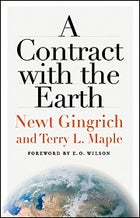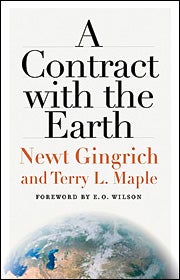OUTSIDE: First, the obvious. Why did you write an environmental book?
Want it? Get it.
A Contract with the Earth, Newt Gingrich

GINGRICH: Discussions had degenerated into a choice between big government, big regulation, and high taxes, and claiming that as environmentalism, or saying, “We’re not even going to talk about the environment.” That gave the country far too limited a range of choices. And it missed the real opportunity: to combine market-oriented, entrepreneurial incentives that work in America with the science and technology that have made us the most successful country in history.
How different is your philosophy from that of the Bush administration?
I think we’re more willing to set strict standards. We have a deeper interest in incentivizing alternative-fuel development. We also take the idea of a national energy strategy more seriously. We need a strategy that’s good for the environment, good for the economy, and good for national security. Unless you can meet those three tests, you don’t have an adequate energy strategy.
Isn’t that exactly what Al Gore would say?
I’m sure Gore is very sincere in his concern for the environment, but I think in a lot of ways that concern is an excuse for higher taxes and more bureaucracy.
So what’s your solution?
The left focuses on punishing people, and we need a strategy that rewards people. Terry and I believe that we are on the edge of a huge scientific revolution. We believe that markets work, and have historically created more choices, of higher quality, lower cost, and greater convenience. The great breakthroughs in human history have occurred when peopleÔÇölike Thomas Edison or Jonas Salk or Bill GatesÔÇöcame along and suddenly created something new and different.
You talk about “sound science” in the book. What does that mean?
We mean fact-based hypotheses, verified by experimentation and data-driven. It’s very dangerous to create a culture in which it’s impossible to dissent without being described as a heretic. If you read the language of the left, anybody who raises reasonable doubts [about global warming] is immediately attacked and isolated. That strikes me as bad science.
So where do you stand on global warming? In a climate-change debate with Senator John Kerry last April, you agreed that it’s realÔÇöand that human activities have contributed to it.
What I said was, there is a sufficient preponderance of evidence that it is reasonableÔÇöwithout reaching an authoritative conclusionÔÇöto be prudent. Conservatism ought to mean prudence. As a prudent matter, lowering the total carbon loading of the atmosphere, I think, is useful.
You write about your lifelong love of the outdoors. Any favorite places?
Georgia’s Okefenokee Swamp is one of my all-time favorites. It’s complex, with such a wide range of animal lifeÔÇöit’s almost primeval. When I taught environmental studies at West Georgia University [in the 1970s], I’d take my classes there for a week at a time, with canoes, so students could understand the rhythm of the natural world and their own limitations and patterns in it.
That’s an excellent lesson.
I was very touched by the writing of [French scientist] Ren├ę Dubos, and the whole notion that we are here to tend the garden, and we have to live within nature. In the end, you can’t live above it, because you are inherently part of the natural experience.


